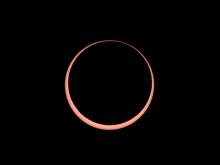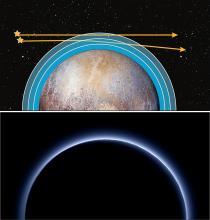Listen to today's episode of StarDate on the web the same day it airs in high-quality streaming audio without any extra ads or announcements. Choose a $8 one-month pass, or listen every day for a year for just $30.
You are here
Eclipse Predictions
The Great American Eclipse is coming up on Monday. The Moon will briefly cover the Sun, turning day to night across a narrow slice of the United States.
The timing of the eclipse is known down to the second, and has been for decades. And today, astronomers can predict eclipses far into the future. But making such predictions isn’t easy. It requires a detailed knowledge of the Moon’s orbit around Earth, Earth’s orbit around the Sun, and even the shapes of Earth and the Moon.
Scientists had been trying to predict eclipses for a long time. Just when they first succeeded is a bit unclear, though.
There’s no doubt that people have been predicting lunar eclipses for thousands of years. But lunar eclipses are easier to predict. Earth’s shadow is roughly a hundred times wider than the Moon’s, so you don’t need as high a level of precision to get it right.
There are stories that the Chinese were predicting solar eclipses more than 4,000 years ago, but no confirmation. An eclipse in 585 BC that stopped a war supposedly was predicted by Thales, a Greek scientist. Many modern-day scientists doubt that, however.
The first confirmed prediction was made by Edmond Halley, using the laws of gravity devised by Isaac Newton. Halley forecast that an eclipse would cross England on May 3rd, 1715. And he was right. So the eclipse of 1715 is known as Halley’s Eclipse — honoring the prediction of an astronomical spectacle.
More about eclipses tomorrow.
Script by Damond Benningfield
More information about the eclipse:







